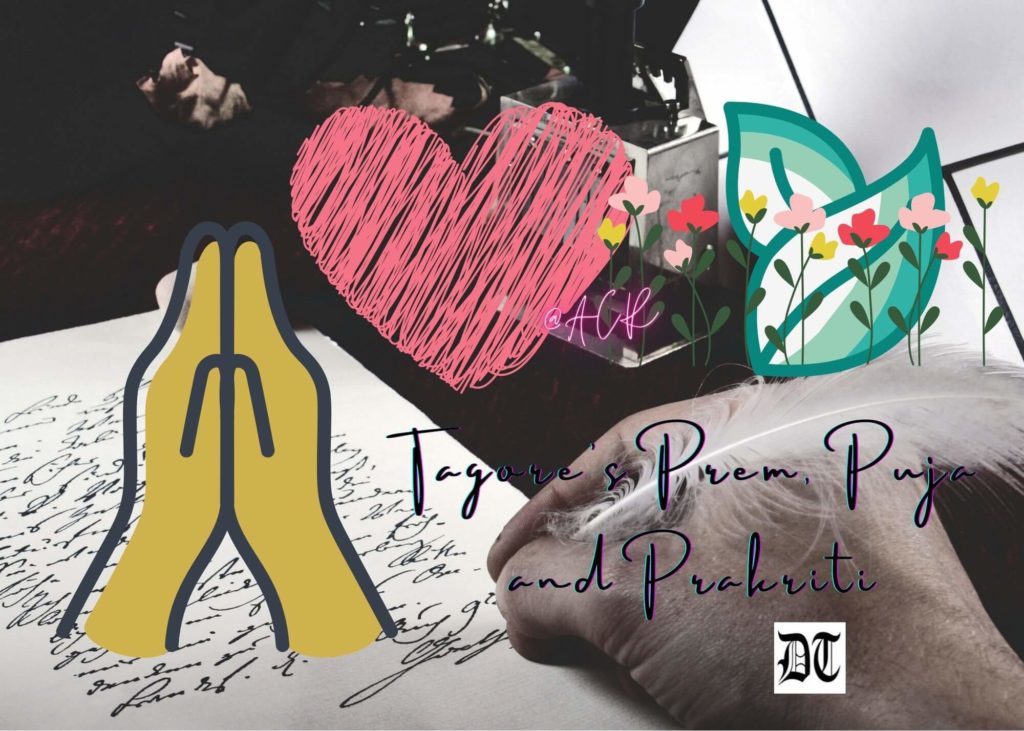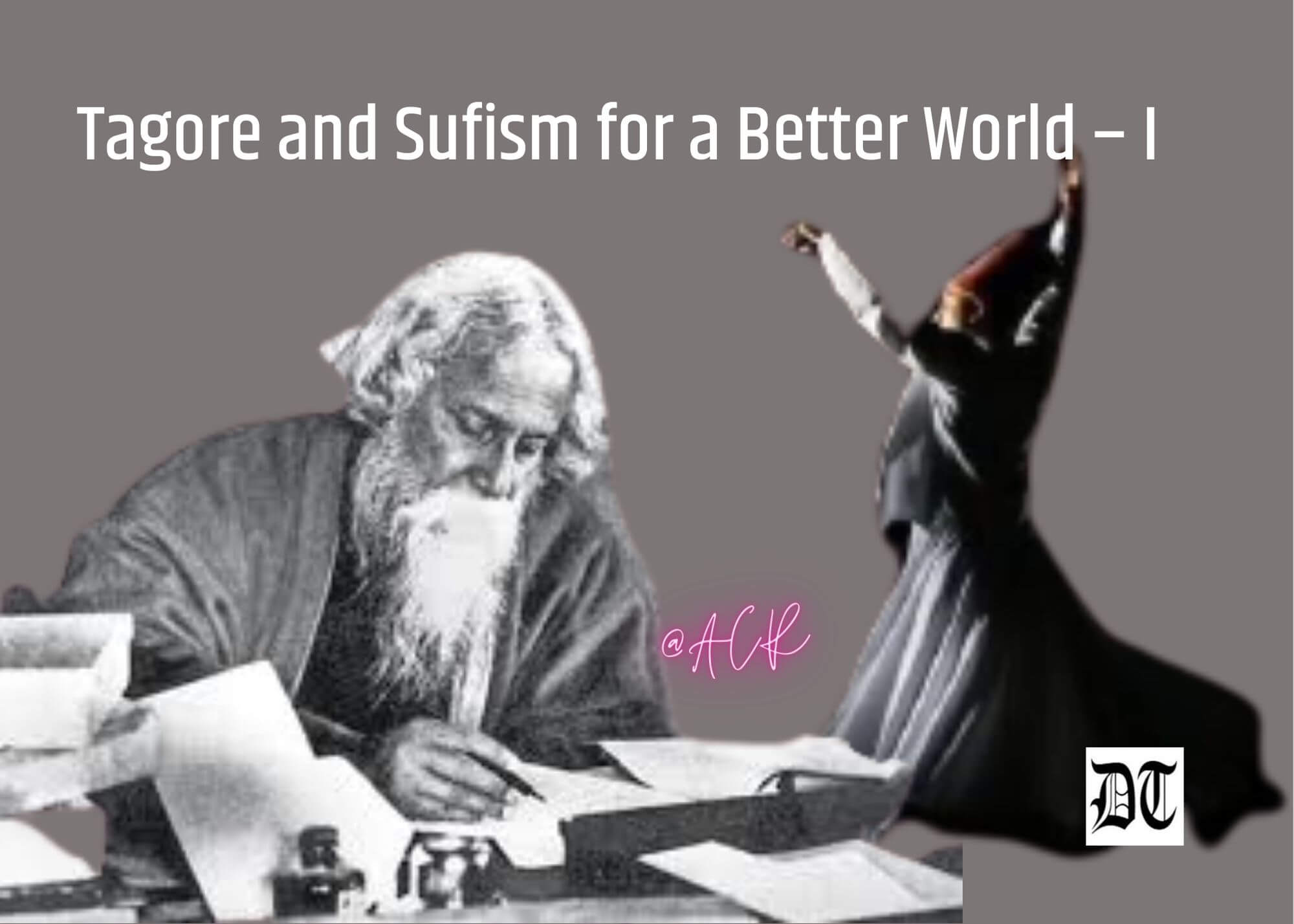In this erudite research paper, in two parts, Prof Laksmisree explores Tagore and Sufism. In the first part, she discovers significant linkages and profound parallels between the compositions of Tagore and those of the Sufi seers, exclusively for Different Truths.
In our contemporary world where nothing but turmoil prevails with a simultaneous yearning for peace and democracy, it becomes almost imperative today for public intellectuals and peace-loving, action-oriented people to seriously rethink and re-configure Tagore within the context of Sufism as a positive avenue to World Peace. It must be admitted, however, that the appropriation and understanding of Tagore within the parameters of any specific concepts, theories, or critical interpretations of his multifaceted creativity, is not just a daunting task but an impossible one. However, there are many scholars, poets, singers as well as the common lovers of art and culture, who are deeply enthused, permeated, and inspired by the rapturous impact of Tagore’s as well as Sufi music and poetry being performed, practiced, and trans-created across the globe.
The starting point in this slightly amorphous canvas could well be Tagore’s English translation of The Songs of Kabir, in 1915, published by the Macmillan Company soon after his winning the Nobel Prize…
One must admit that it is interesting as well as profoundly intriguing in discovering significant linkages and profound parallels between the compositions of Tagore and those of the Sufi seers and poets. The starting point in this slightly amorphous canvas could well be Tagore’s English translation of The Songs of Kabir, in 1915, published by the Macmillan Company soon after his winning the Nobel Prize, in 1913, and being globally recognised as the Indian mystic poet of Gitanjali. Kabir, a celebrated Indian mystic and a Sufi poet of the 15th century has almost the same spiritual vision of the indivisible union of the Creator and the Created, of the unity of diverse human cultures, of the melodies of the soul and the sense as Tagore and the other Sufi poets had, like Jalaluddin Rumi, Amir Khusrau, Khalil Gibran, Lalon Fakir, etc. “The infinite dwelling of the Infinite Being is everywhere: in earth, water, sky and air – He who is within is also without; I see Him and none else”. This translation by Tagore of Kabir’s essential spiritualism and cosmology is also the crux of a definitive denotation of Tagore’s own philosophy of life and poetic practice.
It is this deep perception of the ecstatic unity of love, life, and worship that makes Tagore’s translation of Kabir perhaps more authentic and meaningful than that of Robert Bly. In the Introduction to this book, Evelyn Underhill (who was present in Tagore’s first reading of his translated version of the Gitanjali in the presence ofWB Yeats in Rothenstein’s home in London) clearly states “the trend of Tagore’s mystical genius makes him a peculiarly sympathetic interpreter of Kabir’s poems”.
It is this actualisation of the quintessential spiritual concord of all humanity, nature, and the universe through the Sufi texts of Tagore, Kabir and their ilk, that could be an effective trailblazer and panacea for … a better world of peace and reciprocal amity.
It is in this context of the coalescence of the heightened notions of such poet-seers, that Andrew Harvey, a renowned translator of mystical texts, writes: “The testimony of the greatest mystics to Divinity and to the powers of life and energy becomes our oxygen and force of truth that keeps us hoping and working. With Rumi, Aurobindo, Ramakrishna, Kabir, Tagore and a handful of such spiritual geniuses we find that their realisation transcends all barriers of religion, dogma, country, and civilisation”. It is this actualisation of the quintessential spiritual concord of all humanity, nature, and the universe through the Sufi texts of Tagore, Kabir, and their ilk, that could be an effective trailblazer and panacea for fruitfully disseminating such philosophy in paving our way to a better world of peace and reciprocal amity.

Sufism, in its broadest context, is grounded in the sublime connectivity between the human and the cosmic consciousness, a harmonisation built on the principles of love and universal brotherhood, negating all man-created bristling borders. It is very much akin and well comparable in many of its facets, with all other forms of transcendentalism and romanticism including some meaningful areas of the English Poetry of Wordsworth, Shelley, Yeats, or that of the American Poets like Whitman, Emerson, and Thoreau as well as the Indian mysticism of the songs and poetry of Tagore, Kabir, Lalon Phakir, the Bauls and boatmen-singers of Bengal, importantly the Upanishads (which were largely Tagore’s Creative terrain) and the later ‘Bhakti’ or Vaishnavite Movements, including the International Krishna Consciousness Ideals. Such aforesaid tenets of Creative Liberalism, like that of Tagore and Sufism, enunciate a certain harmony in the Universe that successfully nullifies all boundaries of organised religion and politics which remain the primary provocative material to mobilise divisive forces of searing conflict in our communities and social practices. It advocates a way of life far beyond any religious or ritualistically constrictive codes, hardened dogmas, or ethnic parochialism.
The Sufi poets’ love of God as the beloved or vice versa, is totally alien to the western world of Christianity and to orthodox Islam as well…
The cultural pluralism and accompanying fusion of the erotic with the ecclesiastical in the larger arena of love, of all segments and values of human society united in a broad humanism, so evident in the compositions of Tagore and the Sufi Poets, are central not just to the Indian but to the larger oriental ethos. The Sufi poets’ love of God as the beloved or vice versa, is totally alien to the western world of Christianity and to orthodox Islam as well, in which human love and divine love are mutually opposed, almost warring concepts. Hence, Sufism goes far beyond the traditional religious strictures, almost repudiating them to embrace completeness of being, focussed on a universalist philosophy amalgamating the transcendental Divine with the passionately human.
In the creative writings of Tagore, Rumi, Amir Khusrau, Kabir, and many such, one strongly feels this inward-looking devotion to the Principle of Love as a unifying force in the world of human affairs. Most of Tagore’s songs and poetry, like those of the Sufis, are centered on the interlinked ideas and energies of love (prem), devotion (puja), and nature (prakriti) as integrative facets of a single, coherent apprehension of the supremacy of the human spirit in its infinite love for the universe, an unrestricted link between the microcosm and the macrocosm. this vision faithfully enfolds within itself all that is natural, sense-based, and real as well as components which are ethereal, intangible, unseen, unheard, and unsaid. Tagore had written at a very young age: “The eye cannot see you / Although you are inside the eye / The heart cannot know you / Although you are inside the heart”. Tagore’s other lyric “chokher aloye dekhe chhilem chokher bahire/ antarey aaj dekhbo jokhon aalok nahirey” (“I had seen the outside with the light of the eye/ but will now look inwards to enlighten the darkness within”) is along the same lines as those of Jalaluddin Rumi when the latter says, “…the light which shines is really the light of the heart / where dwells the Immaculate/ Hence close both eyes to see with the other eye / Do not go into the darkness / I tell you the Sun exists”. love and God, man, and nature, the deeply spiritual and the sensuously ecstatic are two sides of the same coin and may successfully become the fulcrum of a better and wiser world for us to understand, enjoy while eliminating all discord.
This synthesising vision manifested in Tagore as well as in Sufi poetry, becomes a predominant cementing factor for the comprehension of this special brand of love, oneness, and spiritualism…
This synthesising vision manifested in Tagore as well as in Sufi poetry, becomes a predominant cementing factor for the comprehension of this special brand of love, oneness, and spiritualism for creating an extraordinary human community of mutual understanding. Our Indian temple facades full of sculpted erotica of our human world easily pave the way for the devout heart to find the object of love and worship deep within the sanctum sanctorum. Kabir writes: “The shadows of evening fall thick / and deep and the darkness of love / envelops the body and mind. / Open the window to the west and be/lost in the sky of love. – / behold the Lord is in this vessel of my body”. A similar resonance is discernible in Tagore’s raptures of the body and soul: “When I go alone at night to my love-tryst / birds do not sing, the wind does not stir – / It is my own heart that beats wildly / When my love comes and sits by my side / the night darkens / It is the jewel at my own breast that shines and gives light”.
To extend the similarities to the Western realms of thought, it would arguably be correct to state that it is only the specific texts of poets of English romanticism and of American transcendentalism, contrary to any Christian tenets, that are logical extensions of Sufism and oriental mysticism. One could very easily perceive in Tagore’s compositions the foundational essences of some of Shelley’s poetry such as “the desire of the moth for the star and the night for the morrow” or for that matter Keats’ poetic affirmations of a pulsating human Love within the fold of Eternity in “Bright Star, would I were steadfast as thou art – Like Nature’s patient sleepless Eremite- / — pure ablution round earth’s human shores / Still unchangeable, / Pillowed upon my fair love’s ripening breast, / To feel forever its soft fall and swell”.
It is this Divinisation of the human and the humanisation of the Divine, which remains the pivotal point of the affinity between Tagore and the Sufi poets.

Tagore’s Prem, Puja and Prakriti series of lyrics embody this Romantic yearning of the lover for the beloved, of the worshipper for the worshipped, of the totality of togetherness in the iconic Radha-Krishna love story so well defined and elaborated upon in Indian Vaishnavite literature and music, especially those of Vidyapathi and Chandidas or in such other Bhakti traditions of an exclusive brand of sensually sacred devotion in India. It is this Divinisation of the human and the humanisation of the Divine, which remains the pivotal point of the affinity between Tagore and the Sufi poets. The longing of the ephemeral Jeevatma or the created for the eternal Paramatma or the Creator, (regarding Tagore’s own interpretations of the Upanishads and his Sufi-oriented craving for a personal God) and the final amalgamation of the blissful dynamism of temporal life with the immortal stasis of inward Godhood and love in the ambit of mysticism/ Sufism in their larger connotations, forms the unconditional bedrock of a world of uninterrupted peace.
The word ‘Sufi’ originates etymologically from the Arabic word Safa, which implies Purity; hence, the emphasis of Sufism on the purity of the heart and soul. The other origin suggested by the 10th-century author Al-Barauni is that the word is linked with Sufia or Sophia, which in Greek means ‘wisdom’. Sufism is generally believed to have originated among Muslims near Basra (modern-day Iraq) though, it is worth noting that the conventional Islamic texts have no mention whatsoever of Sufi traditions and practices. In a certain conclusive way it may be regarded as a break-away philosophy, both mystical and radical in a manner similar to the Brahmo/Arya Samaj of India (embraced by Tagore and other Reformist Thinkers of India) and the Bhakti movements and Baul Songs of Bengal, which also impacted deeply Tagore’s creations against the organized Hindu religion, which he shunned completely. His total surrender to the interwoven facets of love and God, man and nature, of the East and the West and of every class, caste and creed of our world, tied to his unflinching quest for the Sublime within the precincts of the human heart, becomes an essential aspect of the Sufi-element of a revolutionary stance subtly interwoven in Tagore’s poetry. It would be relevant, in this context, to recount that Sufism had taken its birth sometime during the 8th century in areas previously under the influence of the Byzantine civilisation, known for its ideals of a certain refined aestheticism and mysticism which may have progressively spread through the regions of Central and Western Asia to the Indian subcontinent.
(To be continued)
Visuals by Different Truths and the Internet.





 By
By
 By
By
 By
By